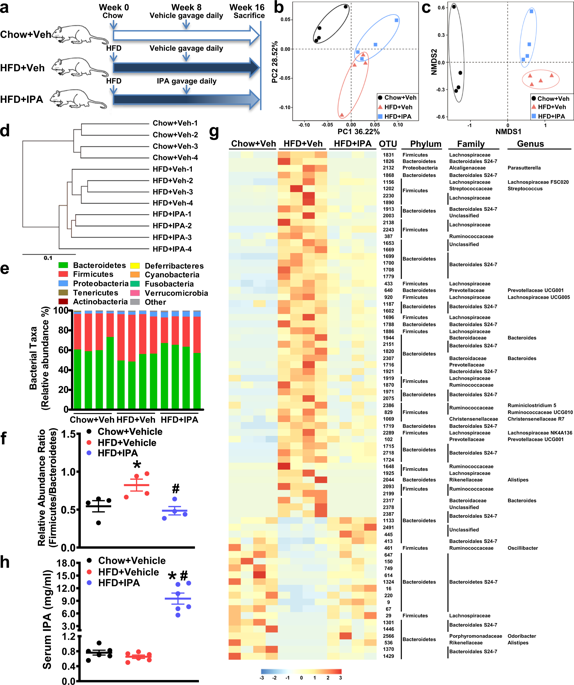当前位置:
X-MOL 学术
›
Exp. Mol. Med.
›
论文详情
Our official English website, www.x-mol.net, welcomes your
feedback! (Note: you will need to create a separate account there.)
Indole-3-propionic acid inhibits gut dysbiosis and endotoxin leakage to attenuate steatohepatitis in rats.
Experimental & Molecular Medicine ( IF 9.5 ) Pub Date : 2019-09-10 , DOI: 10.1038/s12276-019-0304-5 Ze-Hua Zhao 1 , Feng-Zhi Xin 1 , Yaqian Xue 2 , Zhimin Hu 2 , Yamei Han 2 , Fengguang Ma 2 , Da Zhou 3 , Xiao-Lin Liu 4 , Aoyuan Cui 2 , Zhengshuai Liu 2 , Yuxiao Liu 2 , Jing Gao 2 , Qin Pan 1 , Yu Li 2 , Jian-Gao Fan 1, 5
Experimental & Molecular Medicine ( IF 9.5 ) Pub Date : 2019-09-10 , DOI: 10.1038/s12276-019-0304-5 Ze-Hua Zhao 1 , Feng-Zhi Xin 1 , Yaqian Xue 2 , Zhimin Hu 2 , Yamei Han 2 , Fengguang Ma 2 , Da Zhou 3 , Xiao-Lin Liu 4 , Aoyuan Cui 2 , Zhengshuai Liu 2 , Yuxiao Liu 2 , Jing Gao 2 , Qin Pan 1 , Yu Li 2 , Jian-Gao Fan 1, 5
Affiliation

|
Microbial metabolites have emerged as critical components that mediate the metabolic effects of the gut microbiota. Here, we show that indole-3-propionic acid (IPA), a tryptophan metabolite produced by gut bacteria, is a potent anti-non-alcoholic steatohepatitis (NASH) microbial metabolite. Here, we demonstrate that administration of IPA modulates the microbiota composition in the gut and inhibits microbial dysbiosis in rats fed a high-fat diet. IPA induces the expression of tight junction proteins, such as ZO-1 and Occludin, and maintains intestinal epithelium homeostasis, leading to a reduction in plasma endotoxin levels. Interestingly, IPA inhibits NF-κB signaling and reduces the levels of proinflammatory cytokines, such as TNFα, IL-1β, and IL-6, in response to endotoxin in macrophages to repress hepatic inflammation and liver injury. Moreover, IPA is sufficient to inhibit the expression of fibrogenic and collagen genes and attenuate diet-induced NASH phenotypes. The beneficial effects of IPA on the liver are likely mediated through inhibiting the production of endotoxin in the gut. These findings suggest a protective role of IPA in the control of metabolism and uncover the gut microbiome and liver cross-talk in regulating the intestinal microenvironment and liver pathology via a novel dietary nutrient metabolite. IPA may provide a new therapeutic strategy for treating NASH.
中文翻译:

Indole-3-propionic acid 抑制肠道菌群失调和内毒素渗漏以减轻大鼠的脂肪性肝炎。
微生物代谢物已成为介导肠道微生物群代谢作用的关键成分。在这里,我们表明吲哚-3-丙酸 (IPA) 是一种由肠道细菌产生的色氨酸代谢物,是一种有效的抗非酒精性脂肪性肝炎 (NASH) 微生物代谢物。在这里,我们证明了 IPA 的施用可调节肠道中的微生物群组成并抑制高脂饮食大鼠的微生物失调。IPA 诱导紧密连接蛋白(如 ZO-1 和 Occludin)的表达,并维持肠上皮的稳态,从而降低血浆内毒素水平。有趣的是,IPA 抑制 NF-κB 信号传导并降低促炎细胞因子(如 TNFα、IL-1β 和 IL-6)的水平,以响应巨噬细胞中的内毒素以抑制肝脏炎症和肝损伤。而且,IPA 足以抑制纤维化和胶原基因的表达,并减弱饮食诱导的 NASH 表型。IPA 对肝脏的有益作用可能是通过抑制肠道内毒素的产生来介导的。这些发现表明 IPA 在控制新陈代谢方面具有保护作用,并揭示了肠道微生物组和肝脏串扰通过一种新的膳食营养代谢物调节肠道微环境和肝脏病理学。IPA可能为治疗NASH提供一种新的治疗策略。这些发现表明 IPA 在控制新陈代谢方面具有保护作用,并揭示了肠道微生物组和肝脏串扰通过一种新的膳食营养代谢物调节肠道微环境和肝脏病理学。IPA可能为治疗NASH提供一种新的治疗策略。这些发现表明 IPA 在控制新陈代谢方面具有保护作用,并揭示了肠道微生物组和肝脏串扰通过一种新的膳食营养代谢物调节肠道微环境和肝脏病理学。IPA可能为治疗NASH提供一种新的治疗策略。
更新日期:2019-09-10
中文翻译:

Indole-3-propionic acid 抑制肠道菌群失调和内毒素渗漏以减轻大鼠的脂肪性肝炎。
微生物代谢物已成为介导肠道微生物群代谢作用的关键成分。在这里,我们表明吲哚-3-丙酸 (IPA) 是一种由肠道细菌产生的色氨酸代谢物,是一种有效的抗非酒精性脂肪性肝炎 (NASH) 微生物代谢物。在这里,我们证明了 IPA 的施用可调节肠道中的微生物群组成并抑制高脂饮食大鼠的微生物失调。IPA 诱导紧密连接蛋白(如 ZO-1 和 Occludin)的表达,并维持肠上皮的稳态,从而降低血浆内毒素水平。有趣的是,IPA 抑制 NF-κB 信号传导并降低促炎细胞因子(如 TNFα、IL-1β 和 IL-6)的水平,以响应巨噬细胞中的内毒素以抑制肝脏炎症和肝损伤。而且,IPA 足以抑制纤维化和胶原基因的表达,并减弱饮食诱导的 NASH 表型。IPA 对肝脏的有益作用可能是通过抑制肠道内毒素的产生来介导的。这些发现表明 IPA 在控制新陈代谢方面具有保护作用,并揭示了肠道微生物组和肝脏串扰通过一种新的膳食营养代谢物调节肠道微环境和肝脏病理学。IPA可能为治疗NASH提供一种新的治疗策略。这些发现表明 IPA 在控制新陈代谢方面具有保护作用,并揭示了肠道微生物组和肝脏串扰通过一种新的膳食营养代谢物调节肠道微环境和肝脏病理学。IPA可能为治疗NASH提供一种新的治疗策略。这些发现表明 IPA 在控制新陈代谢方面具有保护作用,并揭示了肠道微生物组和肝脏串扰通过一种新的膳食营养代谢物调节肠道微环境和肝脏病理学。IPA可能为治疗NASH提供一种新的治疗策略。


















































 京公网安备 11010802027423号
京公网安备 11010802027423号